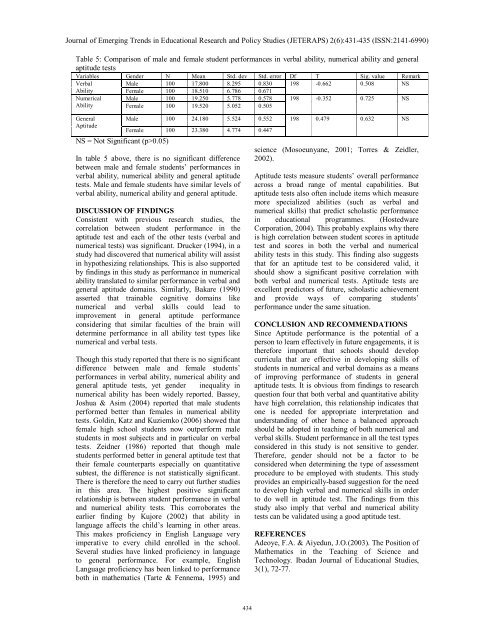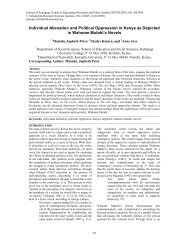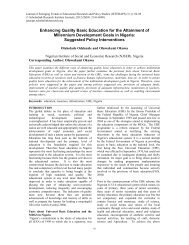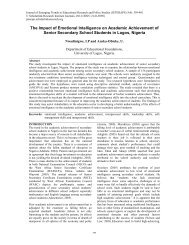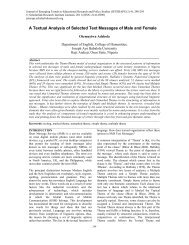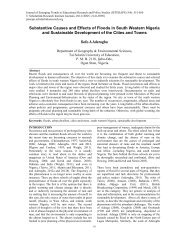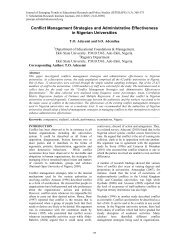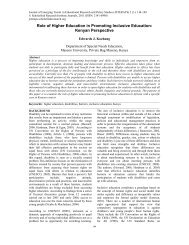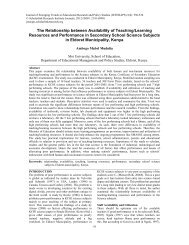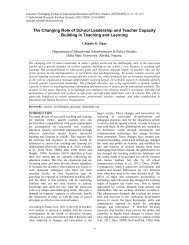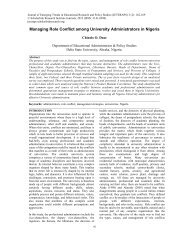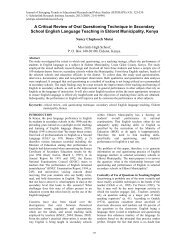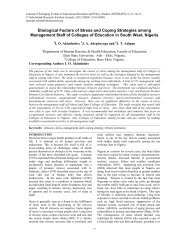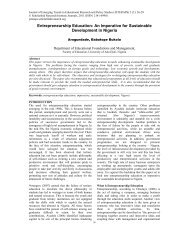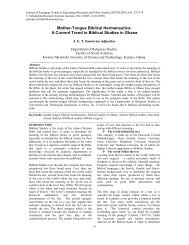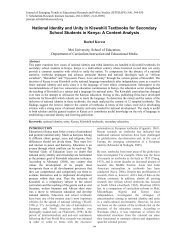Performance of Senior Secondary School Science Students in ...
Performance of Senior Secondary School Science Students in ...
Performance of Senior Secondary School Science Students in ...
Create successful ePaper yourself
Turn your PDF publications into a flip-book with our unique Google optimized e-Paper software.
Journal <strong>of</strong> Emerg<strong>in</strong>g Trends <strong>in</strong> Educational Research and Policy Studies (JETERAPS) 2(6):431-435 (ISSN:2141-6990)<br />
Table 5: Comparison <strong>of</strong> male and female student performances <strong>in</strong> verbal ability, numerical ability and general<br />
aptitude tests<br />
Variables Gender N Mean Std. dev Std. error Df T Sig. value Remark<br />
Verbal<br />
Male 100 17.800 8.295 0.830 198 -0.662 0.508 NS<br />
Ability<br />
Female 100 18.510 6.786 0.671<br />
Numerical Male 100 19.250 5.778 0.578 198 -0.352 0.725 NS<br />
Ability<br />
Female 100 19.520 5.052 0.505<br />
General<br />
Aptitude<br />
NS = Not Significant (p>0.05)<br />
Male 100 24.180 5.524 0.552 198 0.479 0.632 NS<br />
Female 100 23.380 4.774 0.447<br />
In table 5 above, there is no significant difference<br />
between male and female students’ performances <strong>in</strong><br />
verbal ability, numerical ability and general aptitude<br />
tests. Male and female students have similar levels <strong>of</strong><br />
verbal ability, numerical ability and general aptitude.<br />
DISCUSSION OF FINDINGS<br />
Consistent with previous research studies, the<br />
correlation between student performance <strong>in</strong> the<br />
aptitude test and each <strong>of</strong> the other tests (verbal and<br />
numerical tests) was significant. Drucker (1994), <strong>in</strong> a<br />
study had discovered that numerical ability will assist<br />
<strong>in</strong> hypothesiz<strong>in</strong>g relationships. This is also supported<br />
by f<strong>in</strong>d<strong>in</strong>gs <strong>in</strong> this study as performance <strong>in</strong> numerical<br />
ability translated to similar performance <strong>in</strong> verbal and<br />
general aptitude doma<strong>in</strong>s. Similarly, Bakare (1990)<br />
asserted that tra<strong>in</strong>able cognitive doma<strong>in</strong>s like<br />
numerical and verbal skills could lead to<br />
improvement <strong>in</strong> general aptitude performance<br />
consider<strong>in</strong>g that similar faculties <strong>of</strong> the bra<strong>in</strong> will<br />
determ<strong>in</strong>e performance <strong>in</strong> all ability test types like<br />
numerical and verbal tests.<br />
Though this study reported that there is no significant<br />
difference between male and female students’<br />
performances <strong>in</strong> verbal ability, numerical ability and<br />
general aptitude tests, yet gender <strong>in</strong>equality <strong>in</strong><br />
numerical ability has been widely reported. Bassey,<br />
Joshua & Asim (2004) reported that male students<br />
performed better than females <strong>in</strong> numerical ability<br />
tests. Gold<strong>in</strong>, Katz and Kuziemko (2006) showed that<br />
female high school students now outperform male<br />
students <strong>in</strong> most subjects and <strong>in</strong> particular on verbal<br />
tests. Zeidner (1986) reported that though male<br />
students performed better <strong>in</strong> general aptitude test that<br />
their female counterparts especially on quantitative<br />
subtest, the difference is not statistically significant.<br />
There is therefore the need to carry out further studies<br />
<strong>in</strong> this area. The highest positive significant<br />
relationship is between student performance <strong>in</strong> verbal<br />
and numerical ability tests. This corroborates the<br />
earlier f<strong>in</strong>d<strong>in</strong>g by Kujore (2002) that ability <strong>in</strong><br />
language affects the child’s learn<strong>in</strong>g <strong>in</strong> other areas.<br />
This makes pr<strong>of</strong>iciency <strong>in</strong> English Language very<br />
imperative to every child enrolled <strong>in</strong> the school.<br />
Several studies have l<strong>in</strong>ked pr<strong>of</strong>iciency <strong>in</strong> language<br />
to general performance. For example, English<br />
Language pr<strong>of</strong>iciency has been l<strong>in</strong>ked to performance<br />
both <strong>in</strong> mathematics (Tarte & Fennema, 1995) and<br />
science (Mosoeunyane, 2001; Torres & Zeidler,<br />
2002).<br />
Aptitude tests measure students’ overall performance<br />
across a broad range <strong>of</strong> mental capabilities. But<br />
aptitude tests also <strong>of</strong>ten <strong>in</strong>clude items which measure<br />
more specialized abilities (such as verbal and<br />
numerical skills) that predict scholastic performance<br />
<strong>in</strong> educational programmes. (Hostedware<br />
Corporation, 2004). This probably expla<strong>in</strong>s why there<br />
is high correlation between student scores <strong>in</strong> aptitude<br />
test and scores <strong>in</strong> both the verbal and numerical<br />
ability tests <strong>in</strong> this study. This f<strong>in</strong>d<strong>in</strong>g also suggests<br />
that for an aptitude test to be considered valid, it<br />
should show a significant positive correlation with<br />
both verbal and numerical tests. Aptitude tests are<br />
excellent predictors <strong>of</strong> future, scholastic achievement<br />
and provide ways <strong>of</strong> compar<strong>in</strong>g students’<br />
performance under the same situation.<br />
CONCLUSION AND RECOMMENDATIONS<br />
S<strong>in</strong>ce Aptitude performance is the potential <strong>of</strong> a<br />
person to learn effectively <strong>in</strong> future engagements, it is<br />
therefore important that schools should develop<br />
curricula that are effective <strong>in</strong> develop<strong>in</strong>g skills <strong>of</strong><br />
students <strong>in</strong> numerical and verbal doma<strong>in</strong>s as a means<br />
<strong>of</strong> improv<strong>in</strong>g performance <strong>of</strong> students <strong>in</strong> general<br />
aptitude tests. It is obvious from f<strong>in</strong>d<strong>in</strong>gs to research<br />
question four that both verbal and quantitative ability<br />
have high correlation, this relationship <strong>in</strong>dicates that<br />
one is needed for appropriate <strong>in</strong>terpretation and<br />
understand<strong>in</strong>g <strong>of</strong> other hence a balanced approach<br />
should be adopted <strong>in</strong> teach<strong>in</strong>g <strong>of</strong> both numerical and<br />
verbal skills. Student performance <strong>in</strong> all the test types<br />
considered <strong>in</strong> this study is not sensitive to gender.<br />
Therefore, gender should not be a factor to be<br />
considered when determ<strong>in</strong><strong>in</strong>g the type <strong>of</strong> assessment<br />
procedure to be employed with students. This study<br />
provides an empirically-based suggestion for the need<br />
to develop high verbal and numerical skills <strong>in</strong> order<br />
to do well <strong>in</strong> aptitude test. The f<strong>in</strong>d<strong>in</strong>gs from this<br />
study also imply that verbal and numerical ability<br />
tests can be validated us<strong>in</strong>g a good aptitude test.<br />
REFERENCES<br />
Adeoye, F.A. & Aiyedun, J.O.(2003). The Position <strong>of</strong><br />
Mathematics <strong>in</strong> the Teach<strong>in</strong>g <strong>of</strong> <strong>Science</strong> and<br />
Technology. Ibadan Journal <strong>of</strong> Educational Studies,<br />
3(1), 72-77.<br />
434


